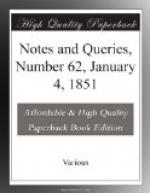Not a single name is given to any of the persons in my Royal Courtly Garland, but the places of action are reversed exactly in the same way as in Greene’s novel of Pandosto, where what Shakspeare represents as passing in Sicily occurs in Bohemia, and vice versa; moreover, the error of representing Bohemia as a maritime country belongs to my ballad, as well as to the novelist and the dramatist. The King of Bohemia, jealous of an “outlandish prince,” who he suspected had intrigued with his queen, employs his cup-bearer to poison the prince, who is informed by the cup-bearer of the design against his life.
“For fear of the king the prince
dare not stay:
The wind being fair, he sailed away,
Saying, I will escape from his blood-thirsty
hand
By steering away to my native land.”
Not long after his departure, the queen, “who had never conceived before” (which varies both from Greene and Shakspeare), produces a daughter, which the king resolves to get rid of by turning it adrift at sea in “a little boat.” He so informs the queen, and she in great grief provides the outfit for the infant voyager:
“A purse of rare jewels she placed
next her skin,
And fasten’d it likewise securely
within;
A chain round her neck, and a mantle of
gold,
Because she her infant no more should
behold.”
It is revealed to the king in a dream that his wife is innocent, but she soon dies of a broken-heart. Meanwhile, the prince, on his return to his own dominions, marries, and has a son. The infant princess is driven on shore in his kingdom, and is saved by an old shepherd, and brought up by him and his wife as their own child, they carefully concealing the riches they had found in the “little boat.”
“This child grew up, endued with
grace,
A modest behaviour, a sweet comely face;
And being arrived at the age of fifteen,
For beauty and wisdom few like her
were seen.”
“Her” is misprinted him in the original, and the whole, as may be expected, is not a first-rate specimen of typography. The son of the prince sees and falls in love with the supposed shepherd’s daughter, and, to avoid the anger of the prince his father, he secretly sails away with her and the old shepherd. By a storm they are driven on the coast of Bohemia:
“A violent storm on the sea did
arise,
Drove them to Bohemia; they are took for
spies;
Their ship was seized, and they to prison
sent:
To confine them a while the king’s
fully bent.”
Here we arrive at an incident which is found in Greene, but which Shakspeare had the judgment to avoid, making the termination of his drama as wonderful for its art, as delightful for its poetry. Greene and my ballad represent the king of Bohemia falling in love with his own daughter, whom he did not recognise. She effectually resisted his entreaties, and he resolves “to hang or burn” the whole party; but the old shepherd, to save himself, reveals that she is not his daughter, and produces “the mantle of gold” in which he had found her:




